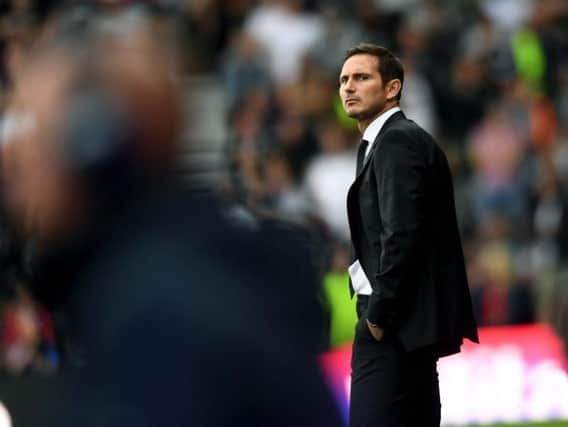Spygate the backdrop for Leeds United's play-off semi-final but Marcelo Bielsa v Frank Lampard deserves a more positive spin


Bielsa versus Lampard in the Championship play-offs was always going to be seen in that context, by anyone looking for a story within the story; the clean-cut Englishman against the eccentric Argentinian who wronged him off the pitch whilst schooled him twice on it. There are some who would like ‘Spygate’ to define Bielsa’s year at Leeds United, to muddy the clarity he has given the club, but it is as much a central theme of Lampard’s season, a lesson to remember in his first year in management.
Full-time at Ipswich Town on Sunday brought a question for Bielsa about ‘Spygate’, which predictably ruffled his feathers. His view that a line was drawn under the controversy a while ago is not so much his opinion as a fact. Leeds took a fine of £200,000, Bielsa paid it personally and an apology was made by the club to the rest of the Championship. The suggestion that he might send staff to watch Derby train again hit at his integrity, the thing he hates most. “You make your question knowing that observing an opponent is now sanctioned,” he said. “You know this perfectly.”
Advertisement
Hide AdAdvertisement
Hide AdElsewhere, at Pride Park, Lampard was involved in a similar discussion. Would ‘Spygate’ have any bearing on the play-off semi-final between Derby and Leeds, not so much in a footballing sense but in the levels of ill-feeling between the two squads and their staff? “I want to take myself out of that one now,” Lampard replied. “I don’t care about the talk of spies. I actually care about the fact they beat us well over two games and have been a really strong team this season.”
The fall-out, conversely, has been as much of a distraction for Lampard as it has for Bielsa and no-one who watched Derby lose 2-0 at Elland Road in January, on the night after one of United’s scouts was stopped by police outside County’s training ground, would say Lampard’s handling of it was conducive to a good day at the office.
There is, as Lampard said on Sunday, a bottom line in all this: that Bielsa’s success in working Derby out has been absolute so far. Leeds’ 4-1 win at Pride Park in August, in Lampard’s second game as manager, was Derby’s heaviest home defeat of the season. The semi-final between them, in any case, deserves a more positive backdrop, reflecting the way in which two coaches with no prior history in the Championship got the measure of it at the first attempt.
Bielsa’s impact has been celebrated from the day the water of his tactics broke over Stoke City, his own man with his own style and a personality the world wants to write about, but Lampard took the plunge into the mayhem of managing a football club last summer and, for all the antipathy towards him in Leeds, has found a foothold. Like Steve Gerrard, he is breaking the mould of an era where so many retired players with his CV sail off into TV punditry.
Advertisement
Hide AdAdvertisement
Hide AdTony Pulis failed to make the play-offs. Gary Rowett, the man whose defection from Derby to Stoke gave Lampard his chance, didn’t get close. Bielsa might not be in the habit of sending Christmas cards to other coaches, and Lampard probably won’t be on his list if he does, but they might understand each other more than it seemed when they were on the phone in January, arguing the toss over a contentious scouting mission.
Leeds’ performance at Pride Park in August was bettered only by their 4-0 flannelling of West Bromwich Albion in March, and everything Bielsa hoped his team would be: on top of possession, full of running, perfectly balanced and deadly up front. Seven shots on target, four goals and all of them carved out by the precision of Leeds’ crossing and finishing. Lampard stood still in his technical area for much of the second half, hands in his pockets, and you wondered then if TV punditry actually held some appeal.
Elland Road in January saw the same whitewash, without the same scoreline. Lampard’s system was identical too – 4-3-3 against Bielsa’s 4-1-4-1, with an attacking line who quickly grew detached from the rest of his team – and a result so clear-cut that Lampard made a point of holding his hands up to that before taking on questions about Spygate.
Leeds, by Bielsa’s own admission, have not played with that verve and fluency often enough in the second half of the season. Derby come into the play-offs on a run of one defeat in 12 and fancying their chances. Bielsa said on Sunday that neither of the clubs’ prior meetings would be “decisive” and what he meant was that neither was especially relevant given the stakes involved now and the number of games both teams have gone through since.
Advertisement
Hide AdAdvertisement
Hide AdThe evidence, though, tells Bielsa that if Leeds play as Leeds can, they will win this semi-final. The evidence tells Lampard that he either takes lessons and adapts to what happened before or risks Bielsa finding him out for a third and fourth time. They have plenty to ponder and too much to get caught up in an argument about a dispute they resolved many weeks ago. There is no getting away from Spygate when Bielsa and Lampard are side by side. But here and now, it barely matters.